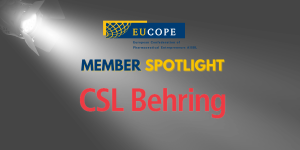Member Spotlight / News - May 30, 2022
EUCOPE Member Spotlight: Q&A with CSL Behring
Every month, EUCOPE spotlights a member company and the great work they’re doing to advance the life sciences industry and drive innovation to serve patients better. In May, we spoke with Ruediger Gatermann, Senior Director Health Policy & External Affairs Europe, CSL Behring.
 Ruediger Gatermann joined CSL Behring in February 2007 and since then has been responsible for the development and execution of the company’s public affairs and policy strategies in Europe. All in all, Ruediger has held public affairs and external relations positions in the pharmaceutical industry since 1987. He graduated from the University of Konstanz, Germany with a degree in Administrative Sciences.
Ruediger Gatermann joined CSL Behring in February 2007 and since then has been responsible for the development and execution of the company’s public affairs and policy strategies in Europe. All in all, Ruediger has held public affairs and external relations positions in the pharmaceutical industry since 1987. He graduated from the University of Konstanz, Germany with a degree in Administrative Sciences.
Tell us about your organisation and its mission and how you drive innovation internally?
CSL Behring is a global biotherapeutics leader driven by our promise to save lives. Focused on serving patients’ needs by using the latest technologies, we discover, develop, and deliver innovative therapies for people living with conditions in the immunology, haematology, cardiovascular and metabolic, respiratory, and transplant therapeutic areas. We use three strategic scientific platforms of plasma fractionation, recombinant protein technology, and cell and gene therapy to support continued innovation and continually refine ways in which products can address unmet medical needs and help patients lead full lives. CSL Behring is part of the CSL group, along with CSL Plasma, which operates one of the world’s largest plasma collection networks.
CSL Behring’s parent company, CSL, was formed more than 100 years ago to save lives using the latest technologies. In the century since, CSL Behring has grown into a global biotechnology leader, driven by that same promise to save and improve lives. We offer the broadest range of quality plasma-derived and recombinant therapies in our industry. Our ability to innovate and deliver life-saving medicines for patients with rare disease and other unmet medical needs around the world has earned us a reputation for always putting patients first.
How do your organisation’s activities help patients now and into the future?
Our commitment is to lead and engage in partnerships spanning across the entire medicine lifecycle to find actionable solutions that benefit patients and healthcare systems overall. We are committed to saving lives and improving the quality of life for patients with rare and serious diseases around the globe.
Our work with patient organisations: CSL Behring actively works with patient organizations to develop unique programs and activities for patients with rare diseases. We’ve also applied our deep understanding of our patients and their families to create our own programs, some of which you will see below. Beyond building that sense of empowerment and community, we partner with these groups to improve and expand educational and awareness efforts about these diseases.
We run a unique advocacy program, called LEAD Grants, that helps at the patient organization level: CSL Behring Local Empowerment for Advocacy Development (LEAD) Grants are community-based grants intended to help local patient advocacy organizations achieve their outreach and support objectives. Through these partnerships, we strive to raise public awareness of and to enhance appropriate public policies for rare diseases.
As part of our ongoing promise to support those living with rare and serious diseases, including bleeding disorders, CSL Behring announced this month a donation of 500 million international units (IUs) of coagulation factor therapy to the World Federation of Hemophilia (WFH) in continued support of the WFH Humanitarian Aid Program. In addition to the product donation, the collaboration between CSL Behring and the WFH supports progress in improving the diagnosis and treatment of bleeding disorders through the WFH’s Global Alliance for Progress (GAP). CSL Behring will provide financial support for logistics costs and training programs designed to address unmet needs for people living with hemophilia in developing countries who are undiagnosed, untreated, or undertreated.
In Europe, CSL Behring joined the EURORDIS-led consortium RARE IMPACT as a corporate partner in January 2021. The initiative aims to optimize patient access to ATMPs in Europe; thus, our participation will help shape the policy and stakeholder environment for cell and gene therapies.
Our work with policymakers: And finally, we work with governments and EU institutions to share our knowledge around the unique needs of the rare disease community, in order to inform decisions through the full understanding of the real value of our therapies, and to ensure patients have timely access to the care and therapies they need. No one knows their condition and the barriers they face better than our patients, and we believe in enabling them to be their own best advocates for better care.
What do you see as the biggest challenge facing the life sciences industry today?
In my view, the biggest challenge – or rather collective commission – is to support innovation across the healthcare sector and to make sure that the system effectively facilitates and increases access to innovative therapies for patients of today and tomorrow.
To address this challenge, there are many actions that must be taken:
- Further focus should be put on improving interactions between all stakeholders, who need to build on promising initiatives, platforms, and consortia to maintain and enhance collaboration and co-creation of solutions. This includes the development of reimbursement frameworks and patient access programs.
- All relevant stakeholders should be involved in the formulation of public policies that can affect business operations, patient access to medicines, and public health. CSL Behring is actively engaging with governments and participating in industry groups and other forums to achieve this.
- Comprehensive evidence on the value of innovations should be communicated to governments, health insurance payers, and other stakeholders to inform access and reimbursement decisions. At CSL Behring, we are committed to the provision of this evidence for every treatment we bring to the market.
- Industry should provide patient support programs and reinforce advocacy efforts that improve access to care.
- All relevant stakeholders, including industry, should ensure that the Commission’s revision of the EU pharmaceutical legislation enables an agile, competitive, and flexible regulatory framework, that is able quickly adapt to scientific advances, including for cell and gene therapies.
We all need to play our part so that Europe becomes a world leader in medical innovation and patients have timely access to lifesaving medicines.
What are the major health policy issues and themes that you are most focused on in 2022?
CSL Behring has a strong heritage in plasma-derived and recombinant medicinal products to treat rare and serious diseases and is investing in gene therapy to bring the next wave of breakthrough medicines to patients with these conditions. Thus, I would like to flag two focus areas for our policy and advocacy activities.
Let me start with plasma and plasma-derived medicinal products (PDMPs). These therapies are essential for 300,000 European patients to treat a variety of rare, chronic, and potentially life-threatening conditions. PDMPs are different from chemically synthesized drugs or biological medicines because the production depends on the availability of human plasma, and large numbers of plasma donations are required to meet patients’ needs. PDMPs are often the only and/or most effective therapies for these conditions and serve to prevent premature death, minimize disabilities, and promote patients’ quality of life.
Globally, we face challenges to meet all the demand and patient needs for these critical products. The revision of the European Union Pharmaceutical Legislation as well as the Blood, Tissues and Cells (BTC) Legislation brings an opportunity to strengthen the legal framework to enable innovation and quick patient access to biotherapeutics such as plasma-derived medicinal products.
It is ethically imperative to implement targeted policies and legislative frameworks aimed to increase the global availability of plasma for the manufacturing of PDMPs. It is critical to work together to meet the growing clinical need of patients. As part of our commitment, CSL is investing in scaling up manufacturing, plasma collection, and fractionation capacities in Europe, with new sites in Germany, through a total investment value of more than 500 million euros.
Comprehensive, targeted policies should provide for stronger measures to enhance our joint ability to collect plasma within Europe, and to expand the possibilities to use plasma collected in other reliable geographies through increased international cooperation and stringent regulatory processes designed to ensure the highest safety standards for plasma donors and patients. This is a critical deliverable that the EU Pharmaceutical Strategy should secure by working hand in hand with industry when it looks at strengthening supply chains and Europe’s strategic resilience and preparedness with targeted measures that take into consideration the specific challenges of PDMPs.
The second area of focus is transformative innovation. We need to address the potential of gene therapy to benefit people living with rare, genetic conditions. Gene therapies can reduce morbidity, and in some cases, stop disease progression entirely by addressing and correcting the underlying genetic cause.
Transformative innovations can be successful only if the system that surrounds them is ready to support their uptake. For gene therapy, patient access may be hampered by challenges related to value assessment, reimbursement policies, and funding models, as well as healthcare systems’ infrastructure and readiness.
To support patient access we see the need to (1) recognize the unique potential of gene therapy when it comes to addressing unmet medical needs; (2) promote the development of appropriate assessment methodology to capture the significant clinical and economic benefits of gene therapy innovation; and (3) co-create new and innovative payment models with payers that reflect the long-term value of gene therapies.
What attracted you to join EUCOPE and how can we help you achieve your business goals?
CSL Behring became a member in 2014 and since 2017 has served on the Executive Board of EUCOPE. As a specialized biotherapeutics company, we specifically value EUCOPE’s network and trusted relationships with established stakeholders at the EU and national levels to connect and share experiences with the European Commission, the European Parliament, Member States’ representatives, patient organizations, healthcare professionals and payers, academics, and other industry associations.
Recently, CSL Behring joined efforts with EUCOPE and other companies to support the launch of the European Alliance for Transformative Therapies, a broad alliance of Members of European Parliament, patient groups, European Reference Networks, academia, and industry. The Alliance aims to raise awareness of the great potential brought by transformative therapies (ATMPs, gene and cell therapies, etc.) and propose solutions to help healthcare systems ensure better patient access.
For more information about EUCOPE membership
Visit our Benefits of Membership Page, or schedule an introductory call with our Business Development Manager Dante Di Iulio diiulio@eucope.org.

